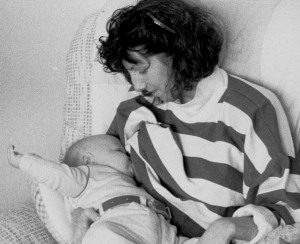 Most parents know mother’s milk is the best nourishment for their babies, but they may not know how really miraculous the biochemistry of breast milk is. Nature has prepared it as a most exquisite elixir, to perfect and complete our journey from one fertilized cell to a young human being. Given the evidence about the comprehensive benefits of nursing our babies, why is there so much ambivalence about breastfeeding? Why do mothers wrestle with the choice of will I or won’t I breastfeed?
Most parents know mother’s milk is the best nourishment for their babies, but they may not know how really miraculous the biochemistry of breast milk is. Nature has prepared it as a most exquisite elixir, to perfect and complete our journey from one fertilized cell to a young human being. Given the evidence about the comprehensive benefits of nursing our babies, why is there so much ambivalence about breastfeeding? Why do mothers wrestle with the choice of will I or won’t I breastfeed?
This inner tug-of-war about breastfeeding is not a modern burden: a  Byzantine legend about the life of Hercules tells that Zeus wanted his bastard son Hercules to nurse from his wife, the goddess Hera, and thus become immortal. He slipped the baby to Hera’s breast while she slept, but when she awoke, Hera shoved the foundling away. The force of the baby’s Herculean sucking sent a spray of gala (Greek for “milk”) into the heavens. Thus was our galaxy christened, producing a term for humankind’s universe that is, appropriately enough, derived from mother’s milk.
Byzantine legend about the life of Hercules tells that Zeus wanted his bastard son Hercules to nurse from his wife, the goddess Hera, and thus become immortal. He slipped the baby to Hera’s breast while she slept, but when she awoke, Hera shoved the foundling away. The force of the baby’s Herculean sucking sent a spray of gala (Greek for “milk”) into the heavens. Thus was our galaxy christened, producing a term for humankind’s universe that is, appropriately enough, derived from mother’s milk.
_________________
I’m posting this today in honor of a wave of support for breastfeeding that began sweeping
across the globe at about 1am my time in Europe, with coordinated demonstrations in Australia
and all over the U.S. Specifically, it is a show of support for women who have experienced
startling harassment by Facebook (censorship, banishment) for posting photos that show
their babies or toddlers breastfeeding. FB claims it violates their obscenity policies
–while at the same time one can easily find the MOST shockingly explicit
sexual images on FB, which are allowed to remain.
_________________
Don’t you find it odd that in today’s culture of skin, skin and more skin, everywhere we look–online, TV, billboards, every possible form of media–that breastfeeding can still manage to pluck chords within our unconscious having to do with modesty and propriety? Is it possible that the chords being plucked by images of nursing mothers don’t in fact have to do with our fairly coarse sensibilities about revealing the body?
Rather than the amount of bare breast revealed (usually not much), I propose that it’s the startling intimacy of breastfeeding that can stir discomfort when a mother nurses in public (even when that “public” is family and friends within a home!). Mother and baby respond to each other physically and emotionally while in direct skin-to-skin contact, which in the minds of many is unconsciously associated with sexual activity—something that should happen in total privacy.
Another obstacle is the sense of imprisonment some women sense in the breastfeeding relationship. True, the seemingly incessant demands by an infant for mother’s milk can sometimes feel like a kind of assault. Our sleep suffers, our capacity to function normally suffers, our ability to accomplish even the most basic tasks suffers. This is when we have the opportunity to develop what people seek at the feet of spiritual masters: the power to respond to what Life is asking of us, in this moment, right now. Presence. Poet Andrea Potos sums it up in the opening of her beautiful poem, “Instructions for the New Mother”: Give up your calendar and clock, start flowing with milk time. (And, get thee to a La Leche League meeting ASAP.)
If you sometimes find the day-in and day-out tasks of mothering to be tedious, you needn’t feel guilty—join the club! It can help enliven our minds to learn more about the subtle complexities and extraordinary implications of what we do every day as mothers, and this is certainly the case with breastfeeding. Here are some ideas to kindle your imagination and inspiration toward embracing breastfeeding with extra delight:
• Powerful immune and growth factors are present in your breast milk in a dynamic way that cannot be duplicated in a laboratory: from colostrum to milk, from night feeding to day feeding, for a healthy baby or an ailing one, a mother’s milk varies its composition in an intricate response to her baby’s immediate needs. A mother produces a different milk for a premature baby than for a term newborn; different milk for an infant than for a toddler; and even different milk for a boy than for a girl!
• One of the main hormones of breastfeeding (together with the “bonding hormone” oxytocin) is prolactin, known as the “mothering hormone”; prolactin is also found in the bloodstream during deep relaxation, meditation or hypnosis. Think of it as a natural coping agent that helps us deal with fatigue and focus on the essential—the baby. It even blurs our short-term memory to help keep us wholly in the present, the only place where our child can meet us. Nature is so clever in her strategic hormonal planning!
• Breastfeeding during the hour following birth—in addition to reducing the risk of postpartum hemorrhaging—is suspected to protect against postpartum depression, as it supports the gaze-to-gaze falling in love process that releases a nurturing flow of oxytocin, serotonin and dopamine. This in turn engages the mother’s brain in the delight of breastfeeding, while beginning to build the oh-so-magnificent and important scaffold for all development and learning in the baby—secure connection. In the process, both mother and baby are enjoying oxytocin’s haze of love—a recipe for bliss! If a mother is struggling in her new role, as I did and so many others do, nursing can go a long way in helping smooth the way; it is a safety net of sorts.
• A powerful soothing element in a newborn’s life is something that has been a constant sensory presence—his mother’s heartbeat. When a baby can look at his mother’s face—his very favorite landscape, a primary stimulus for his brain development—and feel her heartbeat—that comforting, regulating constant he knows so well from the womb—together with the familiar containment of her heart’s energy field , he is in what we would call an optimal learning state. Joseph Chilton Pearce charts nature’s perfect plan for supporting the earliest unfolding of our children’s intelligence: by making human breast milk the weakest and wateriest mother’s milk in the animal kingdom (the lowest in fat and protein) nature ensures that nursing will be very frequent. And thus, the infant’s two critical needs (the face and the heartbeat/heart field) will be met consistently and often, and learning (which for now means developing a secure connection) will unfold according to nature’s brilliant plan!
• Further amplifying the brain-building aspects of breastfeeding, nursing automatically puts the infant into a lateral or cross-crawl position: her outside eye crosses the midline of her body as she gazes at you. This laterality nourishes important neural connections (a positioning good to remember if bottle-feeding).
All else aside, one of breast milk’s most appealing benefits is a practical one for the tired mom: it’s always the right brand, always ready, always at the right temperature, and you never have to stumble around in a dark kitchen to find it.
Of course there are circumstances in which nursing isn’t available to the new mother and baby—adoption, medical conditions contraindicating breastfeeding, and the rare cases in which certain obstacles just cannot be overcome. In such cases, it is important that mothers process the feelings that go along with this if it represents a loss—often including guilt, anger, grief—so that they can bring the same depth of uncomplicated presence to bottle feeding as they had hoped to bring to breastfeeding. The peace-nourishing elements are not just in the flow of milk, but in the flow of connectedness.
 As an adopted baby it was a given that I would be bottle-fed. But I knew nothing of such social arrangements; babies arrive with breast milk, this elixir of life, as their birthright. Thus, I found nursing my son and daughter especially precious. And though they are now adults, I still enjoy a certain abiding confidence gained by breastfeeding them. Deep connection and trust were established through the joy of our nursing relationship that helped very much once the teen years arrived with their tender challenges—in a manner that was out of their conscious awareness but very much in mine.
As an adopted baby it was a given that I would be bottle-fed. But I knew nothing of such social arrangements; babies arrive with breast milk, this elixir of life, as their birthright. Thus, I found nursing my son and daughter especially precious. And though they are now adults, I still enjoy a certain abiding confidence gained by breastfeeding them. Deep connection and trust were established through the joy of our nursing relationship that helped very much once the teen years arrived with their tender challenges—in a manner that was out of their conscious awareness but very much in mine.
We cannot overestimate the effects of breastfeeding in helping create a foundation of peaceful security, joyful comfort and enhanced brainpower for the child—effects that endure lifelong. It is a mighty component of healthy, flourishing social intelligence.
________________
Adapted from Parenting for Peace: Raising the Next Generation of Peacemakers, by Marcy Axness, PhD.
Nursing image by: Aurimas Mikalauskas used under its Creative Commons license.
Galaxy image by: NASA Goddard Photo and Video used under its Creative Commons license.
Tags: breast milk, breastfeeding, nursing



Such a beautifully written piece. Thank you for sharing!